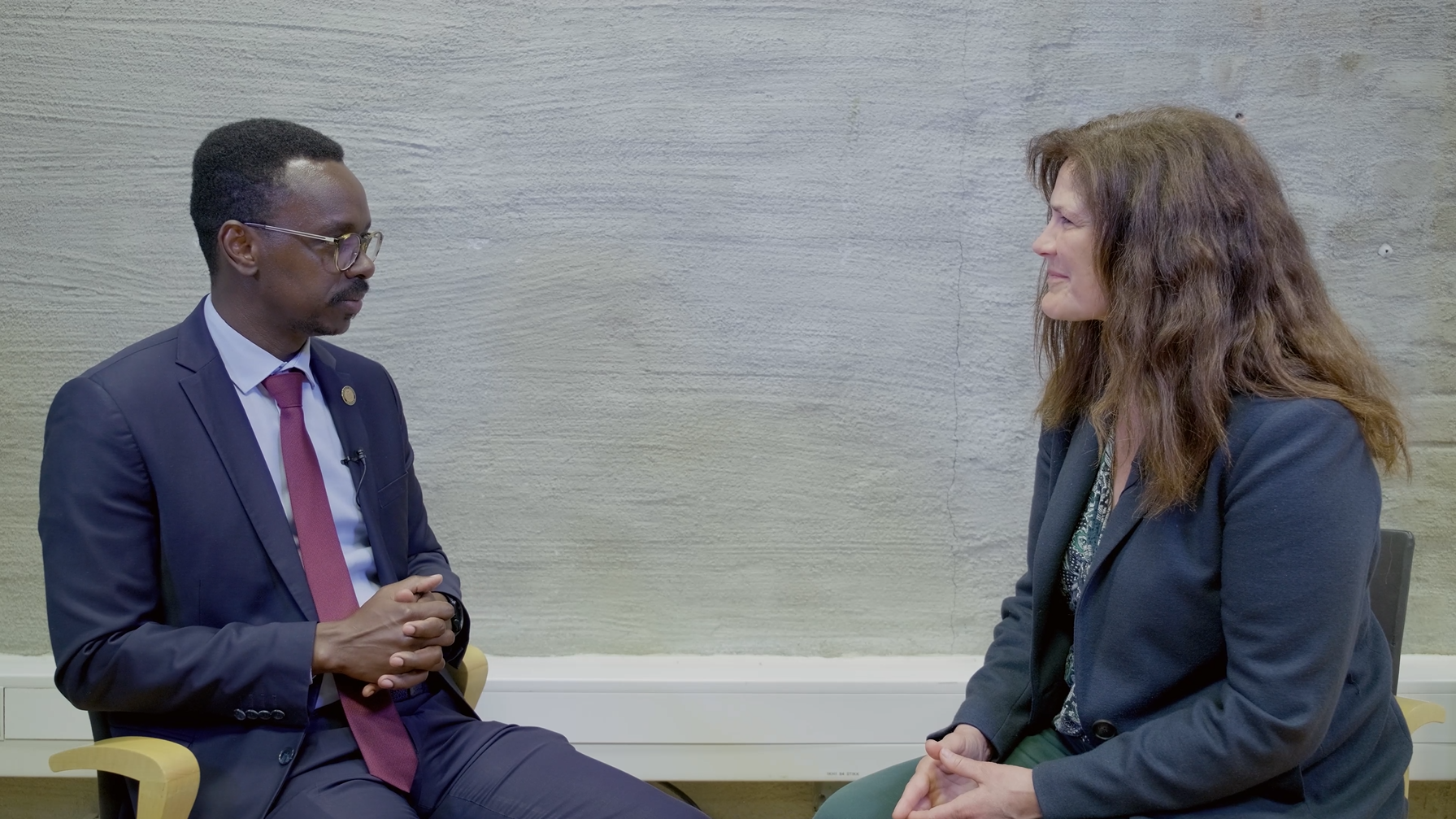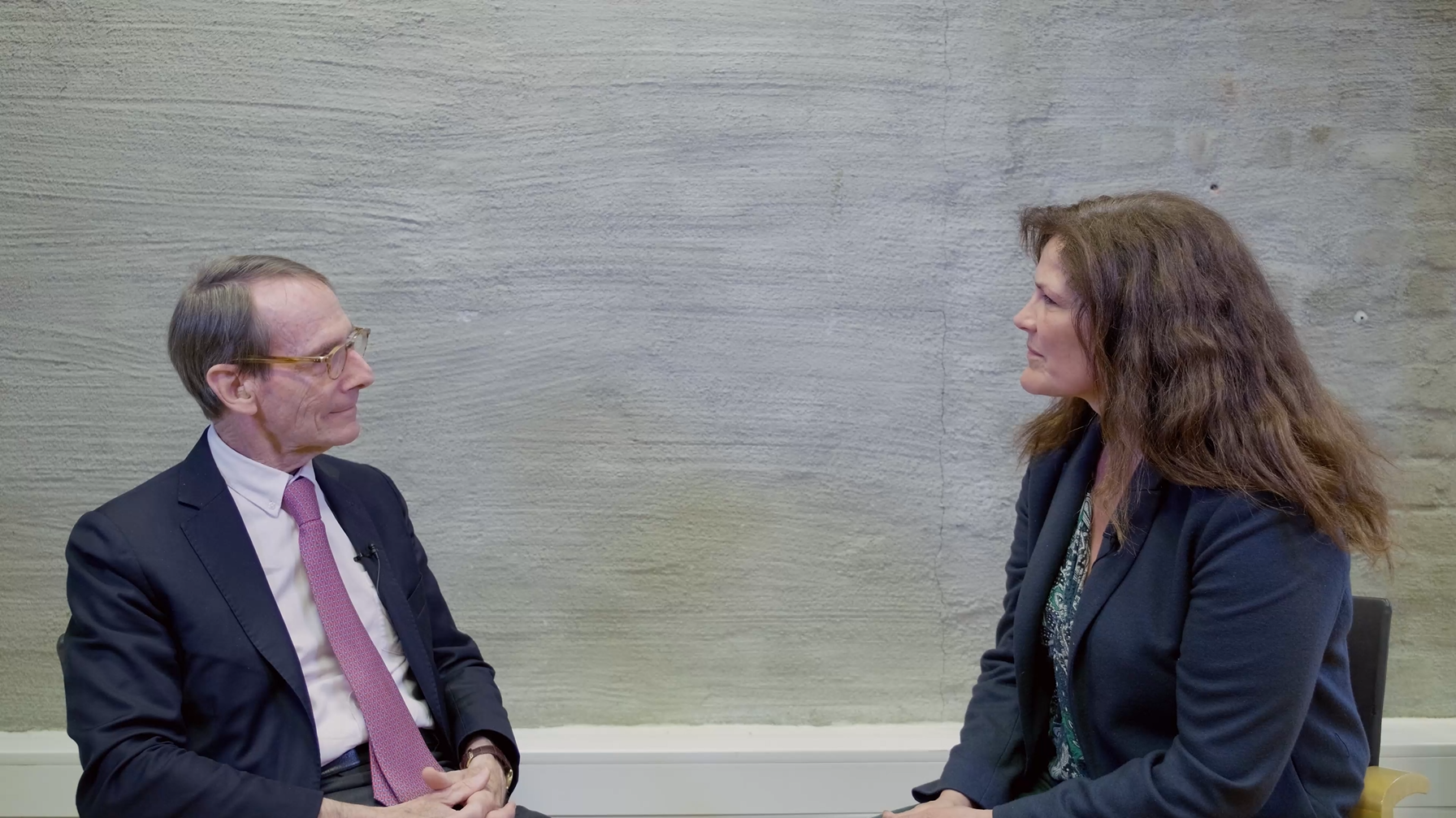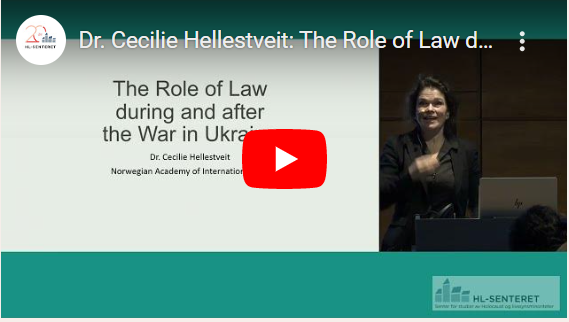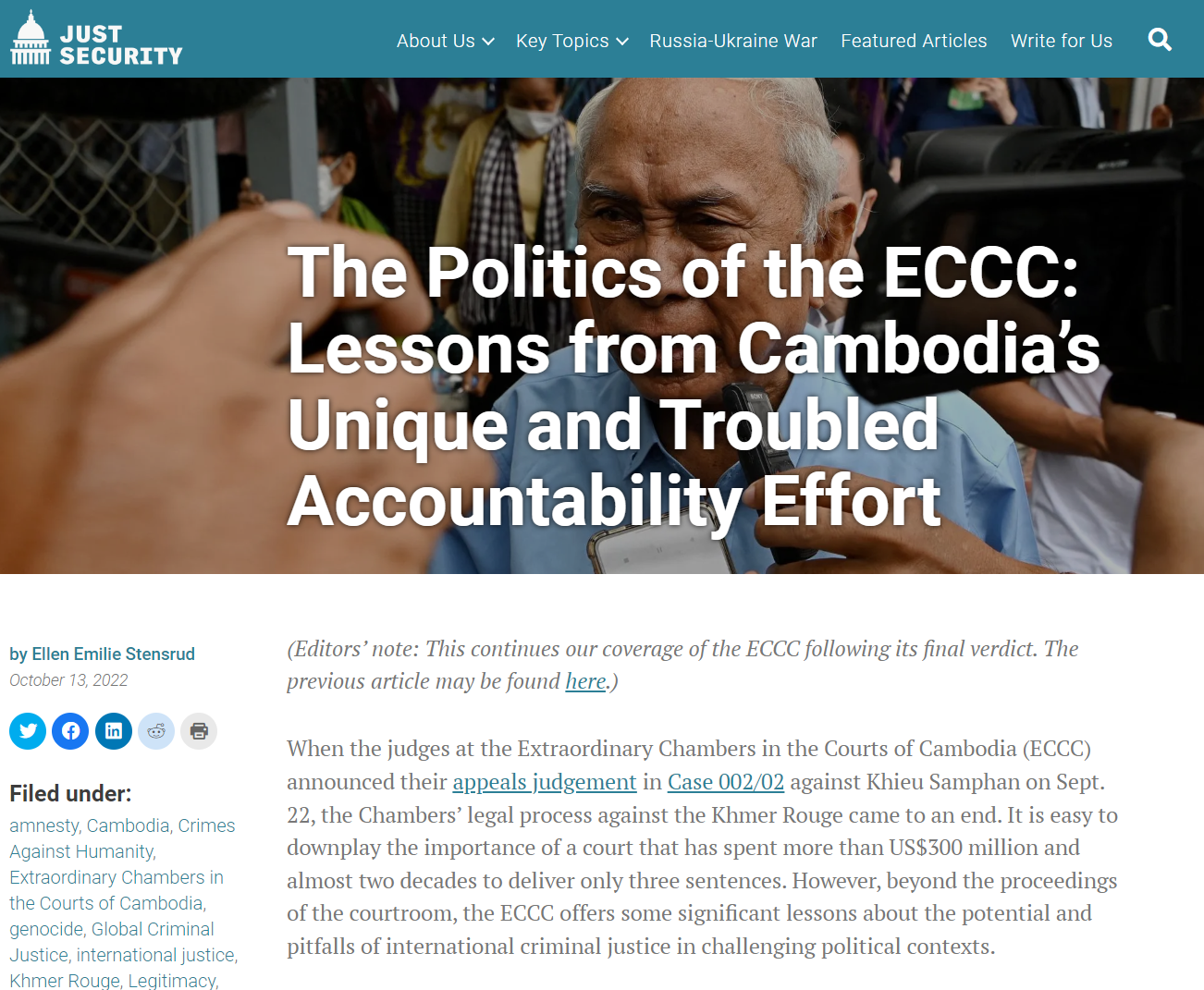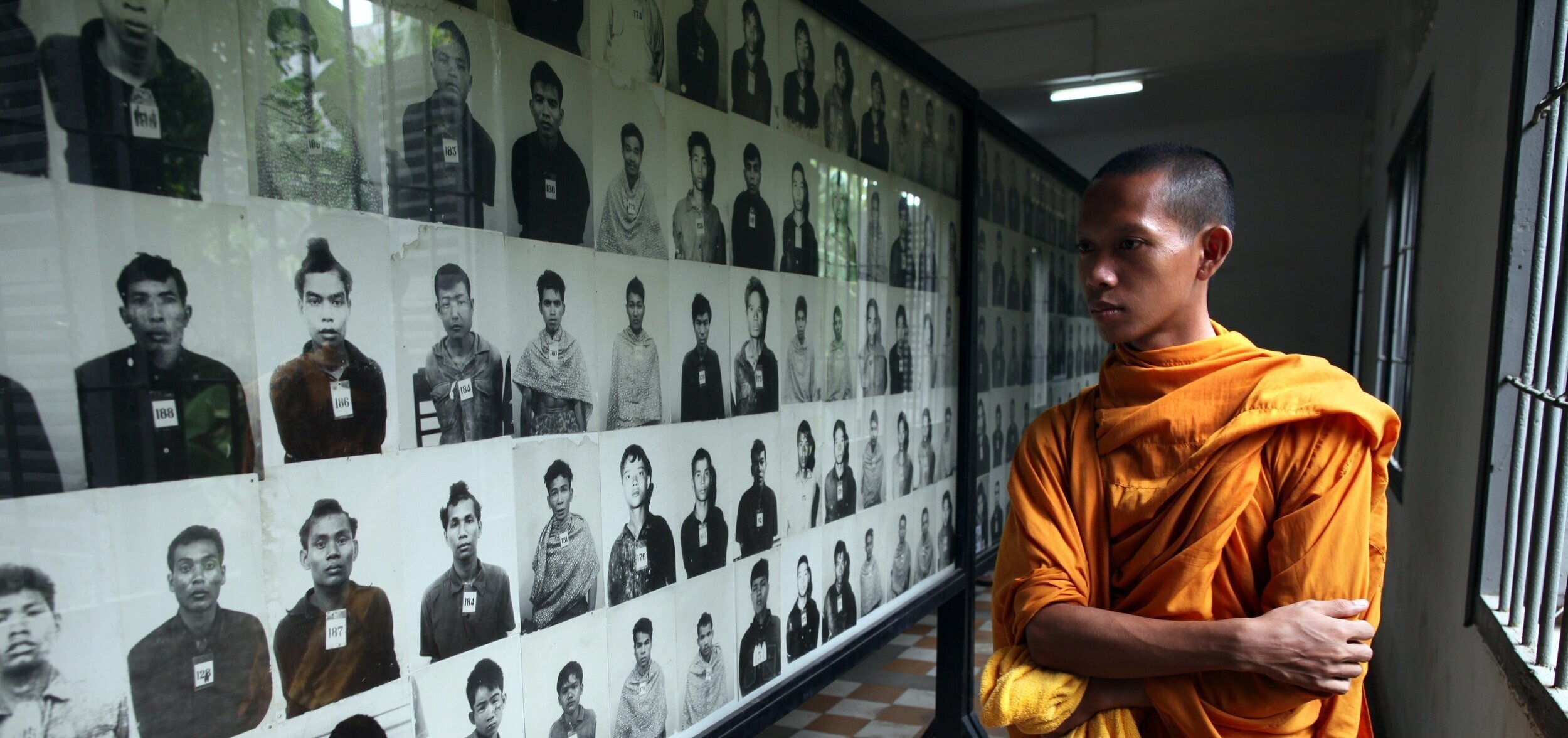
A research blog on genocide and mass atrocity prevention, transitional justice and the political dynamics of mass atrocity crimes.
Nordic Journal of Human Rights Special Issue: Small States, R2P, and atrocity prevention
This special issue of the Nordic Journal of Human Rights explores multiple cases of the relationship between small states of the United Nations and the responsibility to protect (R2P) doctrine.
Although R2P has been struggling for a decade, small states are taking steps to promote the doctrine further. As such, this special issue investigates Ghana, Norway, Denmark, Finland, the Netherlands, Sweden, the Czech Republic, and Slovenia, showing that small states approach R2P differently.
Atrocity prevention and WPS: Lessons for gender-sensitive conflict prevention
This policy brief shows how gender-sensitive approaches to conflict in general, and the WPS agenda in particular, can benefit from applying an atrocity prevention lens. It argues that atrocity prevention is a necessary and useful perspective for diplomats and activists alike.
Genocide in Gaza?
As a legal term, genocide is extremely difficult to apply: It is almost always impossible to prove the presence of an intent to destroy a population before a genocide has already been executed. However, decades of genocide research tell us to take warning signs of genocide seriously - even when it is difficult and uncomfortable.
Implementing gender-sensitive atrocity prevention: Field overview and issues
To promote gender-sensitive atrocity-prevention, this brief report outlines the current state of knowledge regarding atrocity prevention and its gendered dynamics. Drawing on lessons from the WPS agenda and the AP field, we advance recommendations and potential solutions to ensure nuanced and effective gender-sensitive AP implementation.
Interview with Jacqui True, Director of the Centre of Excellence for the Elimination of Violence against Women (CEVAW)
Following her panel discussion at the June 6th seminar on “Gender, Accountability, and Atrocity Prevention” by HL-senteret, PRIO, and STK, the Director of the Centre of Excellence for the Elimination of Violence against Women (CEVAW) Jacqui True agreed to carry out an interview with HL-senteret researcher Ingvill Thorson Plesner. Ms. True addressed the ways gender influences mass atrocities and their prevention, focusing on the cases of Yazidi women, Rwanda, Myanmar, and Afghanistan.
Interview with Savita Pawnday, Executive Director of the Global Centre for R2P
Following her panel discussion at the June 6th seminar on “Gender, Accountability, and Atrocity Prevention” by HL-senteret, PRIO, and STK, the Executive Director of the Global Centre for R2P Savita Pawnday agreed to carry out an interview with HL-senteret researcher Ingvill Thorson Plesner. Ms. Pawnday addressed the ways gender influences mass atrocities and their prevention (mentioning the cases of Rwanda, Srebrenica, and Yazidi women), what obstacles lie between gender-sensitive atrocity prevention, and the similarity between the Women, Peace and Security (WPS) agenda and the Atrocity Prevention agenda.
Interview with Honoré Gatera, Director of the Kigali Genocide Memorial
Following his panel discussion at the June 6th seminar on “Gender, Accountability, and Atrocity Prevention”, Honoré Gatera agreed to carry out an interview with HL-senteret researcher Ingvill Thorson Plesner. His answers touched upon the many various facets of the Rwandan genocide directed against the Tutsi, from the identity and narratives of victims and perpetrators to their gendered dynamics. Here is a snippet of his interview.
Interview with Erik Møse, former ICTR President
Following his panel discussion at the June 6th seminar on “Gender, Accountability, and Atrocity Prevention”, former ICTR President Erik Møse agreed to carry out an interview with HL-senteret researcher Ingvill Thorson Plesner. Here Møse expands on the accountability process during and following the Rwandan genocide directed against the Tutsi, as well as the crucial role of gender in the genocide. Here is the full transcribed interview.
30 Years After the Genocide in Rwanda: Gender, Accountability and Atrocity Prevention - Keynote speech by SRSG Pramila Patten
The June 6th seminar by HL-senteret, PRIO, and STK featured a keynote speech by the UN Special Representative of the Secretary-General (SRSG) on Sexual Violence in Conflict Pramila Patten. The SRSG touched upon a lot of pivotal topics, upcoming challenges, and policy recommendations during her keynote, highlighting the crucial role that gender plays for atrocities and their prevention.
30 Years After the Genocide in Rwanda: Gender, Accountability and Atrocity Prevention - Panel session from HL-senteret, PRIO, and STK seminar
This post explores the many lessons and challenges of atrocity prevention raised during the panel session of the seminar on Gender, Accountability and Atrocity Prevention on June 6th, in collaboration with PRIO and STK, commemorating 30 years since the Rwandan genocide directed against the Tutsi.
Mass Atrocity Resistance –Research project and workshop series
This project studies civilian resistance to mass atrocities. The project is comparative and looks at a variety of actors and strategies. The project is coordinated from the Norwegian Center for Holocaust and Minority Studies.
Resistance against Mass Atrocities Perpetrated by Jihadist Militants
Civilians have resisted atrocities committed by jihadist militants through different strategies such as political alliances and violent resistance. These strategies raise important questions related to the dynamics of resistance and escalation.
Resistance to Mass Atrocities in the Americas
Mass atrocities in the Americas have been resisted through transitional justice mechanisms, self-defence groups and non-violent mobilization. This workshop addressed civilian resistance to atrocities in Chile, Peru, Colombia and Mexico.
Resistance to Mass Atrocities in Southeast Asia
This workshop addressed past and present atrocities in Southeast Asia, and how civilians have mobilized to resist them. Resistance to atrocities in Southeast Asia has manifested in the form of disobedience, survival, flight, insurgence, and civil society mobilization, among others.
The Role of Law during and after the War in Ukraine
In this keynote speech, Dr. Cecilie Hellestveit addresses the role of law in the war in Ukraine. Dr. Hellestveit examines the international legal frameworks and mechanisms of relevance during the conflict, as well as those that will become applicable after capitulation.
The ECCC: Lessons from a Complicated Transitional Justice Effort
In September, the Extraordinary Chambers in the Courts of Cambodia (ECCC) announced the last judgement in the trial against the former Khmer Rouge leader Khieu Samphan, marking the end of the legal process against the Khmer Rouge. The tribunal has been a complicated, yet significant transitional justice effort. In this article in Just Security, Ellen E. Stensrud explains why
The Role of Religious Leaders in Mass Atrocity Prevention
This post sheds light on the role of religious leaders in atrocity risk situations. While the role of non-state actors in crisis scenarios has gained considerable attention internationally, the specific contributions of religious leaders to atrocity prevention have been predominantly studied in the closely-related field of peacebuilding.
Freedom of Religion or Belief and the Responsibility to Protect
This blog entry explores the different manifestations of religion and belief systems in mass atrocity dynamics, and illustrates the relevance of R2P and atrocity prevention to the freedom of religion and belief (FoRB) agenda.
Atrocity prevention in an illiberal world. The role of a small state in the UN Security Council
How can a small state such as Norway, with its seat in the UN Security Council, prevent atrocities like genocide and crimes against humanity? Is the Responsibility to Protect (R2P) doctrine too contested in the current world order?
The Responsibility to Protect in a Digital Age
There is an “atrocity gap” in international human rights protection that needs to be closed for an effective application of R2P online as well as in the real world.






